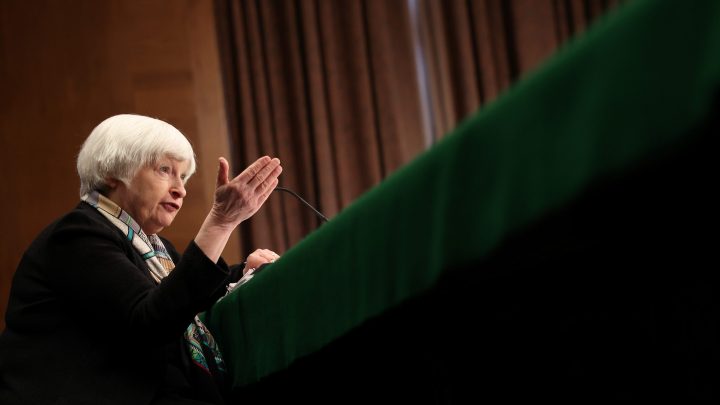
Demand for Treasury bonds dips in times of uncertainty
Demand for Treasury bonds dips in times of uncertainty

You may have noticed our government spends a lot more than it takes in. That of course means the Treasury is going to have to issue a lot of debt in the form of bonds to cover that spending — a lot of it over the next year. Which raises a question: How’s that gonna go?
Recently, it hasn’t been going great. The last few times the U.S. Treasury issued bonds, investors were not impressed.
“Demand is not as robust as it was before,” said Marvin Loh, senior global macro strategist at State Street Global Markets.
The Treasury Department offered investors an interest rate. And investors said, “I don’t think so, do better.” So, the Treasury had to do better.
“If we go into an auction and the interest rate that’s required is higher than where we were before the auction, then it looks like the auction is weaker,” Loh said.
It was weaker because of uncertainty. The last thing an investor wants is to lock up their money in a 10-year bond only to find out that they could have put their money someplace else just as safe, locked it up for less time, and gotten more money for it.
“You’ve kind of lost out on some of that income,” said Sameer Samana, senior global market strategist for the Wells Fargo Investment Institute.
This fear of missing out is very possible right now. Bond investors could put their money in short-term bonds, whose interest rates are strongly influenced — it just so happens — by the Federal Reserve.
So investors want to know what the Fed’s gonna do. But because inflation has been cuckoo-bananas unpredictable recently, they don’t.
“The lack of interest in some of these Treasury auctions is reflecting that uncertainty,” Loh said.
For a given price, investors only have so much appetite. That’s important because they’re going to need to have a very big appetite very soon.
“The overall amount of government bonds coming to the market is more than $10 trillion over the next 12 months,” said Torsten Slok, chief economist at Apollo Global Management.
And yes, he said 10 trillion with a ‘T’ — that’s a third of the U.S. Gross Domestic Product.
To grow bond investors’ appetites that big may not come cheap.
“The ultimate result of that would be that interest rates would be moving up,” Slok said.
The government would have to pay more to take out loans, which could drive up a lot of interest rates in the economy.
“It means that mortgage rates are going up, that means that the price you have to pay on your monthly lease on your car becomes more expensive,” Slok said.
So government borrowing isn’t just a problem for the government, it could be a problem for everyone.
There’s a lot happening in the world. Through it all, Marketplace is here for you.
You rely on Marketplace to break down the world’s events and tell you how it affects you in a fact-based, approachable way. We rely on your financial support to keep making that possible.
Your donation today powers the independent journalism that you rely on. For just $5/month, you can help sustain Marketplace so we can keep reporting on the things that matter to you.












